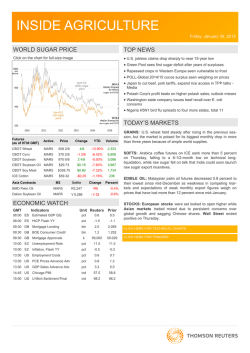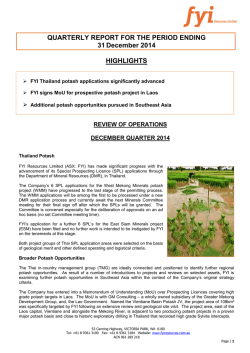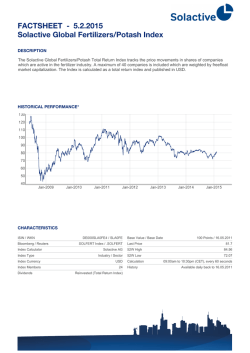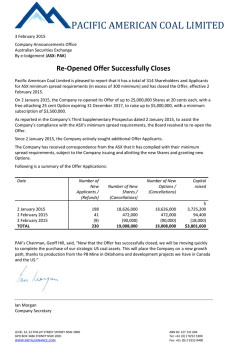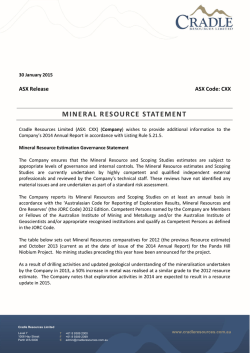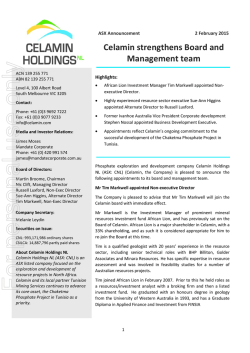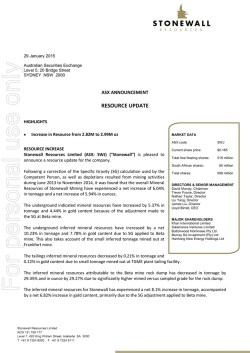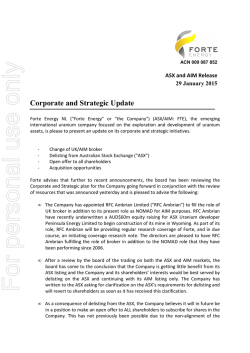
Highly Experienced Colluli Technical Review Committee Appointed
ASX Release 2 February 2015 Company Details Highly Experienced Colluli Technical Review Committee Appointed Highlights Expert team with >100 years of collective experience appointed to ASX Code: STB Share Price $0.225 Market Cap $34M Process design and flow sheet review to commence in February 2015 Shares on issue 149M Outcomes from the review will feed directly into the DFS Company options 28M Colluli PFS remains on track to be completed in February 2015 Cash at Bank $9M Contact Details Managing Director Paul Donaldson review Colluli PFS design prior to DFS South Boulder Mines (ASX: STB) (“South Boulder” or “the Company”) is pleased to announce the establishment of a technical review committee to audit and assess the pre-feasibility (“PFS”) process design, metallurgical testwork, and plant configuration. The process design and flow sheet review is anticipated to commence in February 2015. Address Ground Floor, 31 Ventnor Avenue West Perth WA 6000 PO Box 970 West Perth WA 6872 Telephone +61 8 6315 1444 Facsimile +61 8 9486 7093 Email & Web Page [email protected] www.southbouldermines.com.au The committee will also review the definitive feasibility (“DFS”) optimisation metallurgical testwork completed to date. The committee will comprise Don Larmour from Global Potash Solutions, David Butts from DSB International, John McEwan from McEwan Chemical Engineering Consulting, and Tom Broderick from Hazen Laboratories. South Boulder’s Managing Director, Paul Donaldson said, “We are delighted to have assembled a world class team with more than 100 years of collective experience which has a high level of technical and operational depth in potassium salt processing. “We have purposefully assembled a team that can critically assess the core elements of the Colluli processing plant design including solar evaporation ponds, brine chemistry management, liberation and flotation. “The technical review of the work done to date will not only ensure that we are pragmatically progressing the project to ensure a robust and technically sound design, but also that we are assessing all opportunities to optimise the startup module configuration. “The PFS is expected to be completed in February 2015 while metallurgical optimisation testwork and pilot studies are continuing for DFS,” he added. Background on Committee Members Don Larmour has over 30 years of experience in the potash industry. Having held various engineering positions, Don carries a comprehensive technical and operating background in the areas of brines and conventional potash processing. He has experience in leading capacity expansion design teams, auditing construction, and overseeing plant commissioning. His employer, Global Potash Solutions, has been overseeing the process design, plant configuration and metallurgical testwork for the Colluli project to date while working with Lycopodium process engineers to ensure the configuration is technically and practically robust. David Butts is a chemical engineer and a salt and solar pond expert with over 45 years of experience primarily devoted to the extraction of minerals and salts from lakes, oceans, salars, and underground deposits. He has assisted in the design and operation of plants manufacturing potassium sulphate, potassium chloride, sodium sulphate, sodium chloride, magnesium chloride and other chemicals. John McEwan is a chemical engineer with substantial research and process engineering experience in the potash industry. He has assisted in a number of prefeasibility and feasibility studies and participated in process reviews, equipment evaluation and selection, process flow diagram and drawing reviews, specification reviews as well as capital and operating cost reviews. Tom Broderick is a process engineer and has over 30 years of experience specialising in process design with an emphasis on leaching of salt ores, evaporation and processing of brines, characterisation of salts and development and evaluation of process flowsheets. His employer, Hazen Laboratories, has considerable experience in processing potassium containing minerals including polyhalite, carnallite, kainite and schoenite. More information: Email: [email protected] Website: www.southbouldermines.com.au South Boulder Mines Limited: Telephone +61 8 6315 1444 ABN: 56 097 904 302 Paul Donaldson MANAGING DIRECTOR Amy Just COMPANY SECRETARY About South Boulder Mines Ltd South Boulder is an ASX-listed (ASX: STB) resources company currently developing the emerging, world-class Colluli Potash Project located in Eritrea, Africa. The Colluli Potash Project is located in the Danakil Depression region of Eritrea ~65km from the coast comprising approximately 500km². South Boulder Mines Limited has been actively exploring for potash at the Colluli Potash Project in Eritrea since 2009. Colluli is the world’s shallowest potash deposit (starting at 16m), facilitating the low capex open pit mining and favourably positioned to supply the world’s fastest growing markets. The JORC/NI43-101 Compliant Mineral Resource Estimate for the flagship Colluli Potash Project now stands at 1.08 billion tonnes @ 18% KCl for 194Mt of contained potash. Substantial project upside exists in higher production capacity and market development for other contained products. Engineering Scoping Study (ESS) results were favourable, proving that an economic 2Mt p.a. potash mine can be built at a materially lower cost than typical potash development. The start-up capital cost for Colluli is one of the lowest in the industry; couple this with cheap expansion capability via open pit mining methods, excellent infrastructure and location, and it becomes even more attractive, ensuring South Boulder gains a high level of investment interest for the long term. South Boulder Mines Ltd is working steadily towards developing the world’s first, modern, open pit potash mine. Competent Persons and Responsibility Statement The Colluli Potash Project has a current JORC/NI43-101 Compliant Measured, Indicated and Inferred Mineral Resource Estimate of 1,079.00Mt @ 17.97% KCl or 11.35% K2O (total contained potash of 194.09Mt KCl or 122.61Mt K2O). The resource contains 261.81Mt @ 17.94% KCl or 11.33% K2O of Measured Resources, 674.48Mt @ 17.98% KCl or 11.36% K2O of Indicated Resources and 143.50Mt @ 18.00% KCl or 11.37% K2O of Inferred Resources. This information was prepared and first disclosed under the JORC Code 2004. It has not been updated since to comply with the JORC Code 2012 on the basis that the information has not materially changed since it was last reported by independent consultants ERCOSPLAN and announced by South Boulder on 16 April 2012. The information in this report that relates to Exploration Results and Mineral Resources is based on information compiled by Greg Knox using estimates supplied by South Boulder Mines Ltd under supervision by Ercosplan. Dr Henry Rauche and Dr Sebastiaan Van Der Klauw are co-authors of the JORC and NI43-101 compliant resource report. Greg Knox is a member in good standing of the Australian Institute of Mining and Metallurgy and Dr.s’ Rauche and Van Der Klauw are members in good standing of the European Federation of Geologists (EurGeol) which is a “Recognised Overseas Professional Organisation” (ROPO). A ROPO is an accredited South Boulder Mines Ltd - ASX Release 2 organisation to which Competent Persons must belong for the purpose of preparing reports on Exploration Results, Mineral Resources and Ore Reserves for submission to the ASX. MrKnox, DrRauche and Dr Van Der Klauw are geologists and they have sufficient experience which is relevant to the style of mineralisation and type of deposit under consideration and to the activity which they have undertaken to qualify as a Competent Person as defined in the 2004 Edition of the “Australian Code for Reporting of Exploration Results, Mineral Resources and Ore Reserves”. Mr Knox, Dr Rauche and Dr Van Der Klauw consent to the inclusion in the report of the matters based on information in the form and context in which it appears. Quality Control and Quality Assurance South Boulder Exploration programs follow standard operating and quality assurance procedures to ensure that all sampling techniques and sample results meet international reporting standards. Drill holes are located using GPS coordinates using WGS84 Datum, all mineralisation intervals are downhole and are true width intervals. Assay values are shown above a cut-off of 6% K2O. The samples are derived from HQ diamond drill core, which in the case of carnallite ores, are sealed in heat sealed plastic tubing immediately as it is drilled to preserve the sample. Significant sample intervals are dry quarter cut using a diamond saw and then resealed and double bagged for transport to the laboratory. Halite blanks and duplicate samples are submitted with each hole. Chemical analyses were conducted by Kali-UmwelttechnikGmBHSondershausen, Germany utilising flame emission spectrometry, atomic absorption spectroscopy and ionchromatography. Kali- Umwelttechnik (KUTEC) Sondershausen1 have extensive experience in analysis of salt rock and brine samples and is certified according by DIN EN ISO/IEC 17025 by the Deutsche AkkreditierungssystemPrüfwesen GmbH (DAR). The laboratory follow standard procedures for the analysis of potash salt rocks chemical analysis (K+, Na+, Mg2+, Ca2+, Cl-, SO42-, H2O) and X-ray diffraction (XRD) analysis of the same samples as for chemical analysis to determine a qualitative mineral composition, which combined with the chemical analysis gives a quantitative mineral composition. South Boulder Mines Ltd - ASX Release 3
© Copyright 2026
